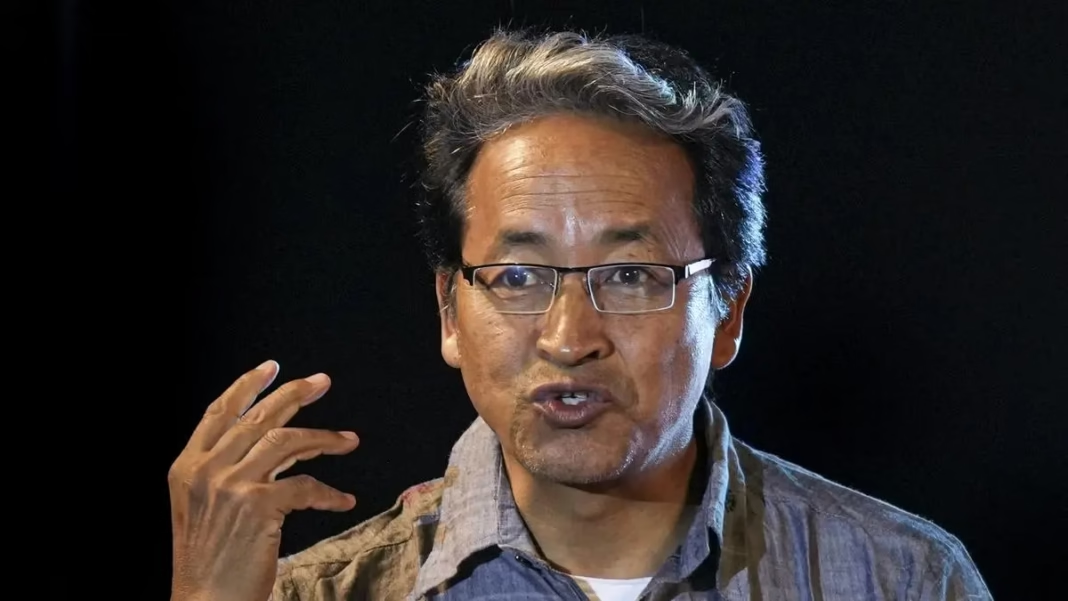Ladakh, India — Climate activist and Ramon Magsaysay Award winner Sonam Wangchuk was arrested on Friday under the National Security Act (NSA), just days after violent protests in Leh left four people dead and more than 70 injured during a shutdown called to demand statehood and Sixth Schedule status for the Union Territory of Ladakh.
According to official sources, Wangchuk was taken to Leh airport by a police team led by Ladakh Director General of Police S.D. Jamwal, with preparations underway to shift him outside the Union Territory, possibly to Delhi. Internet services in Leh were suspended soon after his detention.
RELATED NEWS : 4 Killed, 50 Injured as Ladakh Statehood Protest Turns Violent in Leh
The 59-year-old activist, widely known for his environmental campaigns in the Himalayas, was scheduled to address the press on Friday afternoon. Instead, he was asked to accompany the police, and permission for his press conference was denied.
Authorities said Wangchuk was detained under the NSA, which allows for extended preventive detention, in connection with the recent violent protests in Leh. Officials stressed the arrest was not tied to other pending cases against him.
Fallout of the Arrest
The Leh Apex Body (LAB), which is spearheading the statehood movement, strongly condemned the detention, insisting that Wangchuk had no role in the September 24 violence.
LAB convener Mr. Lakrook said that no talks could yet be held with the Union Ministry of Home Affairs (MHA) in Leh due to the pending last rites of the four civilians killed during the clashes. According to him, the victims will be cremated on September 28 and 29.
“We will seek early talks on two key issues of Statehood and Sixth Schedule after we travel to Delhi on September 29,” Mr. Lakrook said.
He further rejected claims that Wangchuk provoked protesters:
“This narrative that Mr. Wangchuk provoked protesters is wrong. It was the news of two protesters on hunger strike who were hospitalised on September 24 that caused concern among youth. The next day, around 7,000 people, mostly young people, joined the hunger strike.”
Leh remained under curfew for the second straight day, and dozens of local residents, including Wangchuk’s supporters, were detained in the past 24 hours. In Kargil, authorities imposed Section 163 of the Bharatiya Nyaya Sanhita (BNS), barring gatherings of more than four people. Shops in Leh’s main market also downed shutters in protest against the arrest.
Political Reactions
The detention of Wangchuk has drawn sharp criticism across political lines.
Omar Abdullah, Chief Minister of neighboring Jammu and Kashmir, called the move “unfortunate but not surprising.”
“What’s difficult to understand is why the Centre has failed to fulfil its promises,” he said.
Congress leader G.A. Mir described the detention of the “honourable Gandhian activist” as “unwarranted.”
Former J&K chief minister and Peoples Democratic Party (PDP) president Mehbooba Mufti said Wangchuk’s detention was “deeply disturbing.”
“A lifelong advocate of peace, sustainability and truth is being punished merely for demanding that promises be kept. Today, Leh is under curfew with internet shut down, a grim echo of what Kashmir has long endured. In today’s India, speaking truth to power comes at a heavy cost—or how else could a man who stood for peace and non-violence his entire life end up behind bars?”
Background
The unrest marks a sharp escalation in the long-running agitation in Ladakh. Protesters are demanding full statehood and constitutional safeguards under the Sixth Schedule, which would grant greater autonomy over land, resources, and cultural protections.
The arrest of Sonam Wangchuk—one of the region’s most prominent voices—has further inflamed tensions, raising fears of prolonged unrest in the Union Territory.
SOURCE : DT & THE HINDU | Follow Us: Facebook | Instagram | Twitter | Youtube |



